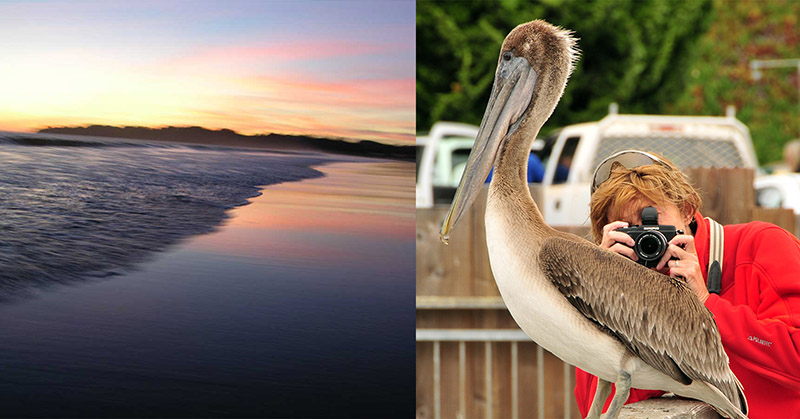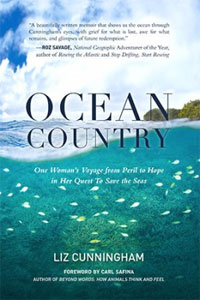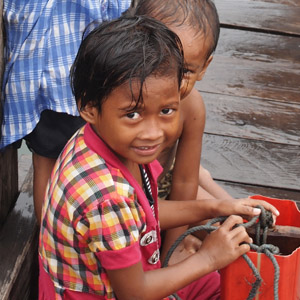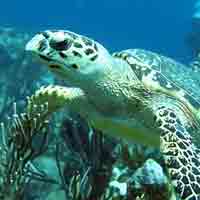
Stinson Beach at sunset; a pelican north of Santa Barbara, one of the many types of seabirds injured and killed in the oil spill. photos by Charlie Costello
“Residents to the left!” a U.S. Customs official bellowed. “Non-residents to the right!”
In late May I was returning from the Turks and Caicos Islands. “What’s new?” I asked a woman next to me in line. “I’ve been away from the news.”
“Oil spill. Santa Barbara,” she said as she rolled her bag forward. “But just a little spill.”
Just a little spill? I thought. For whom?
She meant only 101,000 gallons of oil versus the 210 million gallons that gushed from the Deepwater Horizon Oil Blowout in 2010. Yes, in comparison, the recent Santa Barbara oil spill is small—a nine mile long slick. But is it little?
A few days later I went to my favorite haunt, Stinson Beach. What if the entire two and half mile long stretch of Stinson Beach—and all the crabs and seabirds and sea lions and other creatures—were marred in oil? How would the residents of Stinson Beach feel?
As of early June, thirty-six sea lions, nine dolphins, and eighty-seven birds have died due to the spill, which means wings, fins, beaks, and feathers were streaked with crude oil to the point of being lethal. Another thirty-two sea lions, six elephant seals, and fifty-eight birds have been rescued and are being treated.
“Little” is what the oil industry would like us to think it is. Contained. Managed. An unfortunate occurrence that we must accept so we can survive and be safe. Oil equals power and we need that power so we can protect our way of life.
An alternate view is gaining traction rapidly. The divesture movement is growing. People are reducing their carbon footprints, saying with their actions, “Excuse me, but I don’t need all that oil.” They don’t see this spill as “little.” They see it as more like a scab or lesion indicative of much larger pattern of damage. It’s like a lifelong smoker having a coughing fit—is it just a little cough or indicative of a larger problem? The cigarette companies would prefer you think it’s just a little cough.
The company operating the eroded pipe that burst in Santa Barbara, Plains All American, and its subsidiaries operate 17,800 miles of crude oil and natural gas pipelines in the United States. It is one of the worst violators listed by the U.S. Pipeline and Hazardous Materials Administration and has been cited for 175 safety and maintenance infractions since 2006. And all of this happens in the context of how fossil-fuel usage damages our planet—among the long list, bleached coral reefs, extreme weather, ocean acidification, sea level rise, strip mining of forests, and toxic air quality.
But the truth of how much destruction is occurring is so glaring that we sometimes forget how much we can do, how much is possible. A small army of people raced to the site to help stranded marine mammals and sea birds. They need our help. For thirty dollars you can adopt a marine mammal through the Marine Mammal Center of Sausalito. The Marine Mammal Center is a member of the Oiled Wildlife Care Network, and has sent specially trained staff and volunteers, along with equipment, to assist in rescues at the oil spill. The Santa Barbara Wildlife Care Network cares for thousands of sick, injured, oiled, and orphaned animals each year. They need our help too.
Last Wednesday the California Senate passed SB788, legislation which closed offshore drilling loopholes, forever banning new oil drilling in state waters of the California coast. More than 15,000 people signed petitions endorsing it, and it was supported by a broad coalition of environmental organizations, fishermen’s organizations, tribal groups, and clean-water advocates. Other petitions now need similar support.
The Ocean Conservancy needs support in their call to halt drilling for oil in the Arctic.
http://www.oceanconservancy.org/forms/no-reckless-drilling.html
350.org needs your help to urge President Obama to reject the Keystone XL pipeline
http://350.org/campaigns/stop-keystone-xl/
It’s easy to think, “Oh, I’m just little me and what difference would my little donation or signing a petition matter?” A hapless exercise in self-congratulatory futility? No, I am learning. Thoughts like these are like false gold—they’re so ingrained that one mistakes them for truth. It is in the interest of the fossil fuel industry for us to think our actions don’t matter and signing petitions won’t matter. The reverse is the true gold: it’s in the interest of our future and the future of the earth to remind ourselves daily that our actions do matter and live as if they did. And the silver lining is thick: that’s a happier life.





Thank you, Liz, thank you, for keeping us informed – – and perhaps for keeping oil companies a little more . . . nervous?